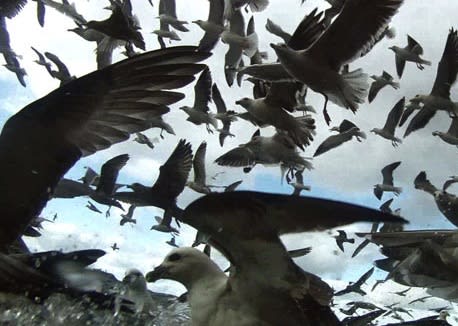Like the works of Nikolaus Geyrhalter or, to a lesser degree, Godfrey Reggio, Lucien Castaing-Taylor and Verena Paravel's Leviathan is structurally experiential and passive, observing its environment and juxtaposing images with an unspoken narrative or emotional intent. The distinction here is that of space and environment, being confined to a commercial fishing vessel and having an omniscient eye looking into every nook and cranny, above and below water, inside and outside of the ship.
In a way, the occasionally stationary, but often disorienting camerawork (which, on occasion, would make even Gaspar Noé queasy) tells the story, taking on the dimension of the subject, capturing the tedium of repetitive tasks and schedules in a confined environment, when not swishing around erratically like the boat. The advent of nature as an overriding, powerful force that bounces the boat and its passengers around, capable of toppling them at any moment with a sheer exaggeration of conflicting elements, similarly guides the interpretation of the text.
But this analysis is mostly left up to the viewer, since these images of fish being released from a net, burying the camera, or birds diving in the ocean for the excess debris left behind after the cleaning and gutting of the catch are merely the quotidian experience of those working on the vessel. Moments of a man falling asleep while watching TV or a severed fish head balancing on the edge of the ever-shifting ship suggest a mortality parable, which is reiterated by the film's dedication to the many lives lost on fishing boats throughout the North Atlantic, but none of this is specified.
Ignoring interpretation, Leviathan is intriguing — or adversely dull, for those not keen on experimental documentaries — for its sheer cinematic ingenuity. Cameras are positioned throughout the ship in unlikely areas — below eye level as the men work or waving back and forth off the edge of the ship — capturing the wetness and dirtiness of the experience.
This gritty, almost unpleasant and potentially nauseating style matched to the mechanized, creaking repetition of catching fish adds an existential element to the series of images. Their bleak, oft-horrific composition could read as a comment on the futility of being and the fragility of an existence that could easily be swept up in a net and disposed of in a couple of quick motions.
(Films We Like)In a way, the occasionally stationary, but often disorienting camerawork (which, on occasion, would make even Gaspar Noé queasy) tells the story, taking on the dimension of the subject, capturing the tedium of repetitive tasks and schedules in a confined environment, when not swishing around erratically like the boat. The advent of nature as an overriding, powerful force that bounces the boat and its passengers around, capable of toppling them at any moment with a sheer exaggeration of conflicting elements, similarly guides the interpretation of the text.
But this analysis is mostly left up to the viewer, since these images of fish being released from a net, burying the camera, or birds diving in the ocean for the excess debris left behind after the cleaning and gutting of the catch are merely the quotidian experience of those working on the vessel. Moments of a man falling asleep while watching TV or a severed fish head balancing on the edge of the ever-shifting ship suggest a mortality parable, which is reiterated by the film's dedication to the many lives lost on fishing boats throughout the North Atlantic, but none of this is specified.
Ignoring interpretation, Leviathan is intriguing — or adversely dull, for those not keen on experimental documentaries — for its sheer cinematic ingenuity. Cameras are positioned throughout the ship in unlikely areas — below eye level as the men work or waving back and forth off the edge of the ship — capturing the wetness and dirtiness of the experience.
This gritty, almost unpleasant and potentially nauseating style matched to the mechanized, creaking repetition of catching fish adds an existential element to the series of images. Their bleak, oft-horrific composition could read as a comment on the futility of being and the fragility of an existence that could easily be swept up in a net and disposed of in a couple of quick motions.
